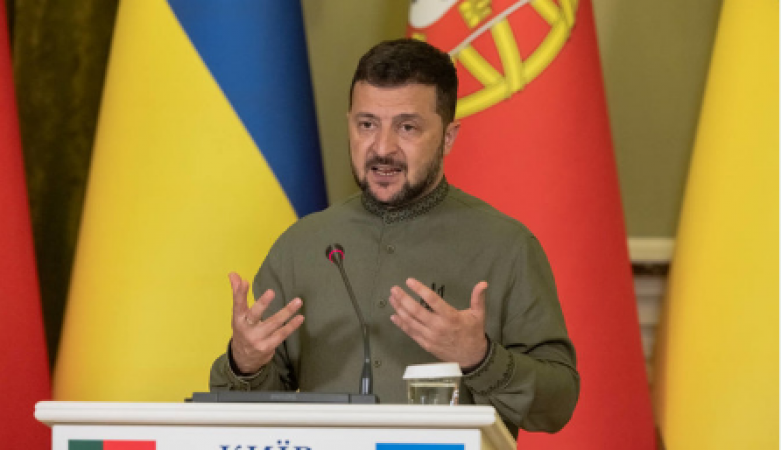
Kiev: In a promising development for international trade and food security, two additional ships have successfully traversed a temporary shipping corridor in the Black Sea, as announced by Ukrainian President Volodymyr Zelenskiy on a recent Saturday. These ships, laden with essential grain commodities, embarked on their journey from the port of Pivdenniy in southern Ukraine, bound for the critical Bosphorus Strait, according to Zelenskiy's tweet. However, specific details regarding the vessels involved and the exact timing of their passage have not been disclosed.
This temporary corridor was hastily established by Ukraine after Russia withdrew from a United Nations-backed grain export agreement in July, a pact devised to facilitate the safe passage of grain-laden ships departing from Ukraine's Black Sea ports. Russia's abrupt withdrawal from the agreement sent shockwaves through the international community, triggering concerns about a potential global food shortage, given Ukraine's status as a major exporter of wheat and corn.
Efforts by the United Nations to broker a new deal aimed at resuming grain exports from Ukraine have been underway since Russia's departure from the original agreement. The recent passage of two ships through this corridor represents a positive step forward. Nevertheless, the extent to which this corridor can be utilized by numerous ships remains uncertain, primarily due to Russia's stance on guaranteeing the safety of vessels navigating this route.
Also Read: China's Economy Faces Most Significant Slowdown in 28 Years Amidst Lingering Lockdown Impact
Russia has explicitly stated that it cannot ensure the security of ships traversing the corridor, raising legitimate concerns about potential interference or intimidation by Russian forces. Recognizing these concerns, the United Nations has been diligently engaged in negotiations with Russia to secure guarantees that will safeguard the ships passing through this vital route. However, the timing and outcome of these negotiations remain unclear.
The successful passage of the two ships is undoubtedly a welcome development, yet it is still too early to determine whether it will significantly alleviate the global food shortage crisis. Moreover, it is crucial to acknowledge that these two ships represent only a fraction of the grain inventory currently stranded in Ukrainian ports.
Also Read: Controversial Move: US Considers Sending Depleted Uranium Munitions to Ukraine
To have a meaningful impact on the burgeoning global food crisis, a multitude of ships must gain access to this temporary corridor. Consequently, much depends on the ongoing negotiations between the United Nations, Russia, and Ukraine to establish a secure environment for these vital shipments.
In addition to the two ships that have already navigated the corridor, a third vessel, carrying precious wheat cargo, is scheduled to set sail from the port of Pivdenniy in the imminent days, with its departure slated for Monday.
However, the collective passage of these three ships, although promising, barely scratches the surface of the immense grain stockpile currently held captive in Ukrainian ports. The world awaits the outcome of negotiations and diplomatic efforts, all of which hinge on the fundamental question of whether this temporary corridor can be made accessible to a significant number of ships, and if so, when.
As the international community closely monitors the situation, the urgency of resolving this issue cannot be overstated. The global food shortage is a looming crisis, and access to the Black Sea corridor remains a critical lifeline for many nations that rely on Ukrainian grain exports to sustain their populations and stabilize their economies.
Also Read: Escalating Tensions: Iran Accuses Israel of Plotting to Sabotage Missile Program
While the passage of two additional ships through the Black Sea corridor is a positive development, it represents only a small step towards addressing the global food shortage crisis. The fate of countless more shipments hangs in the balance, contingent upon securing assurances of safety from Russia.
The United Nations continues its diplomatic efforts, but the timeline for resolution remains uncertain. As the world watches and waits, the hope remains that a swift and comprehensive solution can be reached, ensuring the uninterrupted flow of vital grain resources to nations in need.